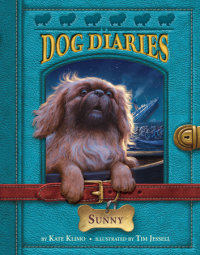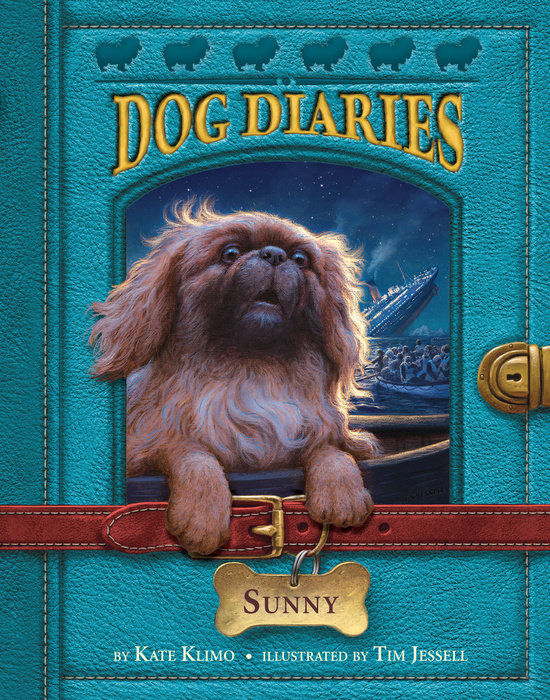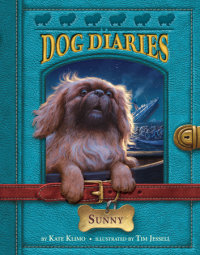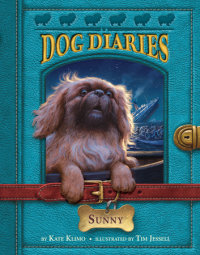Dog Diaries #14: Sunny
Dog Diaries #14: Sunny is a part of the Dog Diaries collection.
Fans of dog stories and the RMS Titanic, take note! This new entry in the Dog Diaries series—based on a true story—is narrated by a pampered Peke that survived the fateful voyage!
Sun Yat-Sen—aka Sunny—enjoys the finer things in life. Noble canine companion to globe-trotters Henry and Myra Harper, Sunny doesn't even like to walk, preferring instead to be carried! Sunny and the Harpers are traveling on the maiden voyage of the RMS Titanic—the biggest, finest ship in the world. So imagine Sunny's horror when he learns he must stay in the Titanic's kennel with eleven other dogs, not in the Harpers' luxurious stateroom! It's . . . unthinkable! But only four days into the voyage, Sunny learns the true meaning of tragedy when, hidden inside Myra's fur coat, he escapes the sinking ship in a lifeboat.
Based on a true story, with realistic black-and-white illustrations throughout and a fact-filled appendix that includes information about the RMS Titanic, Pekingese dogs, and more, this is historical fiction for middle graders who don't realize they like historical fiction!
An Excerpt fromDog Diaries #14: Sunny
If someone had told me that one day I’d be keeping a diary, I would have said, “Old boy, you must be stark-staring mad. Me? The canine companion of glamorous globe-trotters Mr. Henry Sleeper Harper and his charming wife, Myra? Do I look like some sort of owlish scribbler?” I have always said leave the diary keeping to those ambitious, brainy types, like border collies and pinschers. We Pekingese are meant for finer things. No inky paws for me, thank you very much.
But that was before I set sail on the RMS Titanic, the newest, sleekest, most deluxe ship in the White Star Line fleet. On its historic maiden voyage, it was to carry us far across the ocean, from Europe to our home in New York City, in seven short days. As it turned out, that voyage gave me something to write about. More, in fact, than I could ever have imagined.
Simply everyone who was anyone was aboard. The cream of canine society. Heading up the list was the Airedale companion of the fabulously wealthy John Jacob Astor. The beloved chow chow of stockbroker Harry Anderson also had a ticket. Then there was the prize French bulldog purchased in England by banker Robert Daniel for what I hear was an indecently high price. And who could forget little Frou-Frou, that foolish little bit of fluff? I could go on, but you’ll meet them all soon enough, all ten of them. Eleven, including yours truly. Eleven lucky dogs—or so we thought at the time. And let us not forget those humans aboard without dogs—poor lonesome souls! They just happened to number among the wealthiest humans alive, including the silver-mine queen of Colorado, Margaret Brown, and businessman Benjamin Guggenheim, a friend of the ship’s captain. And have I mentioned Lady Duff-Gordon and Lady Rothes? Why, there were so many wealthy people on board, they called it “the Millionaires’ Special.” Sadly, as it turned out, there are some things even money cannot buy.
Titanic. There was such a bold ring to the name. Just hearing it gave me the tingles as I sat on the train that took us from Paris to the dock at Cherbourg, France. Myra was busy doing this and that with Henry, so I sat in the lap of our man, Hammad Hassat.
Hammad had joined our happy crew on a recent tour of Egypt. He was the Harpers’ interpreter and guide to the wonders of that ancient land. Don’t ask me what he was still doing with us (not that I minded one jot). Henry thought it would be a lark to bring Hammad back to America with us. And who, one must wonder, could possibly have need of an Egyptian interpreter in New York City? I suspect Henry wanted to be the first in his set to boast of an Egyptian manservant. That was Henry. Such a wag. (You should excuse the expression.)
Hammad was frightfully mysterious and dashingly handsome. Everywhere we went, people stared at him. But Hammad cast his eyes downward. I think he felt like an outsider. He was also sad. And who could blame the poor dear chap? He missed his family in Cairo. I was perhaps his only friend. Wasn’t he the lucky one?
Hammad, unlike me, was not looking forward to the voyage. The only body of water he had ever crossed before embarking on this trip was the river Nile. He was jittery on the boat from Egypt to Marseille. And the Mediterranean is a mere pond compared to the vast Atlantic Ocean.
In Paris, Hammad sent a marconigram to his brother, Said, in Cairo. He wanted to share with him the news of our upcoming voyage. (Marconigrams were the newfangled way humans sent messages to one another over long distances via a clever sort of wire.) Hammad’s brother wired back to say that he foresaw the future. And what did he see? Death and destruction on the high seas. Can you imagine such a thing?
If Hammad was a Gloomy Gus, I was a ray of sunshine. At least I tried. (They don’t call me Sunny for nothing!) Old man, this voyage is going to be duck soup—you’ll see, I told Hammad. Strictly smooth sailing!
I said this not in so many words, of course. We Pekes aren’t much for barking. (And yapping isn’t really my style.) But we do have the most expressive eyes. Some say we are “all eyes.”
Hammad knew and spoke many languages— including the one my eyes spoke. He understood me well. And I was equally good at reading his brooding silences. But for all my efforts to cheer him, Hammad could not shake his air of gloom and doom. Now I know why. But then I thought he was just being moody.
We arrived at the dock to find a large crowd of fellow travelers and well-wishers. But where was the Titanic? A couple of tenders bobbed against the pilings: the SS Traffic and the SS Nomadic. (Don’t ask me why, but humans just love to name things. Their ships, their houses, their racehorses, even their dogs—rather poorly, I might add.)
Cheer up, old chap, my eyes told Hammad. Our trusty pals here, Traffic and Nomadic, are here to take us to the Titanic, no doubt.
Hammad heaved a dispirited sigh. I could tell that he wished the Titanic had sailed without us.
While mates and servants piled mountains of luggage into the tenders, first-class passengers were ever so huffy. Why was there no grand ship here to meet them?
“Say, old man,” Henry asked the mate assisting us in boarding the Traffic, “where is the Titanic?”
“Not to worry, sir,” said the mate. “It left Southampton exactly at noon. It should be here anytime now.”



